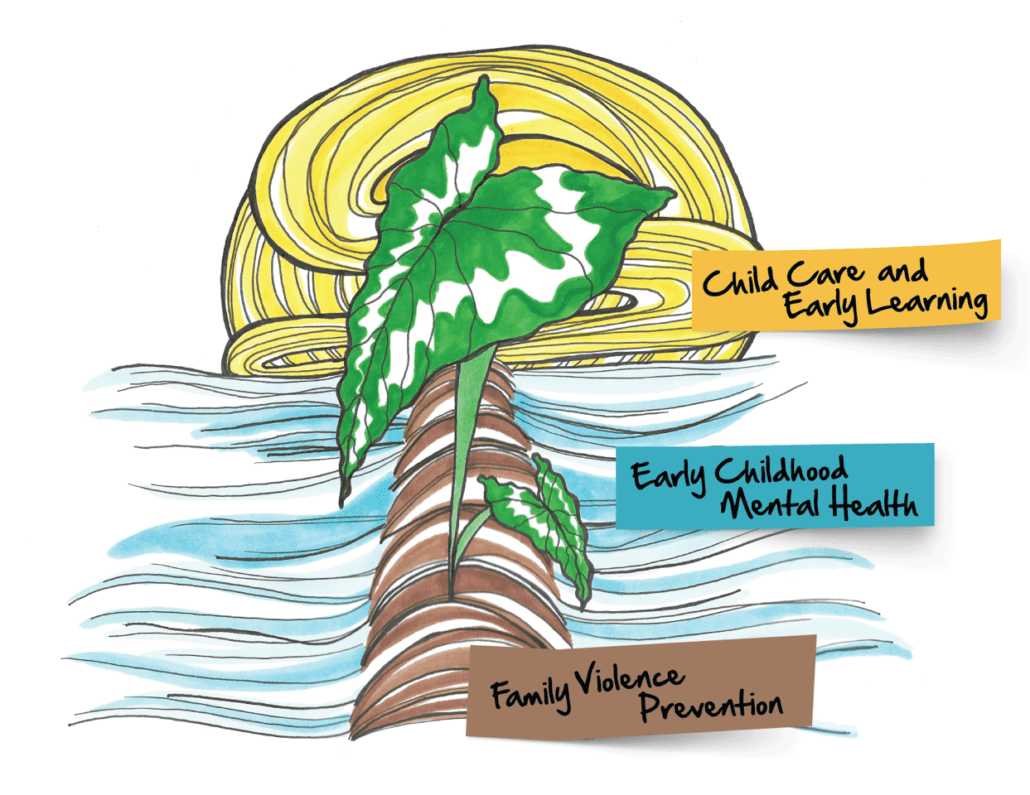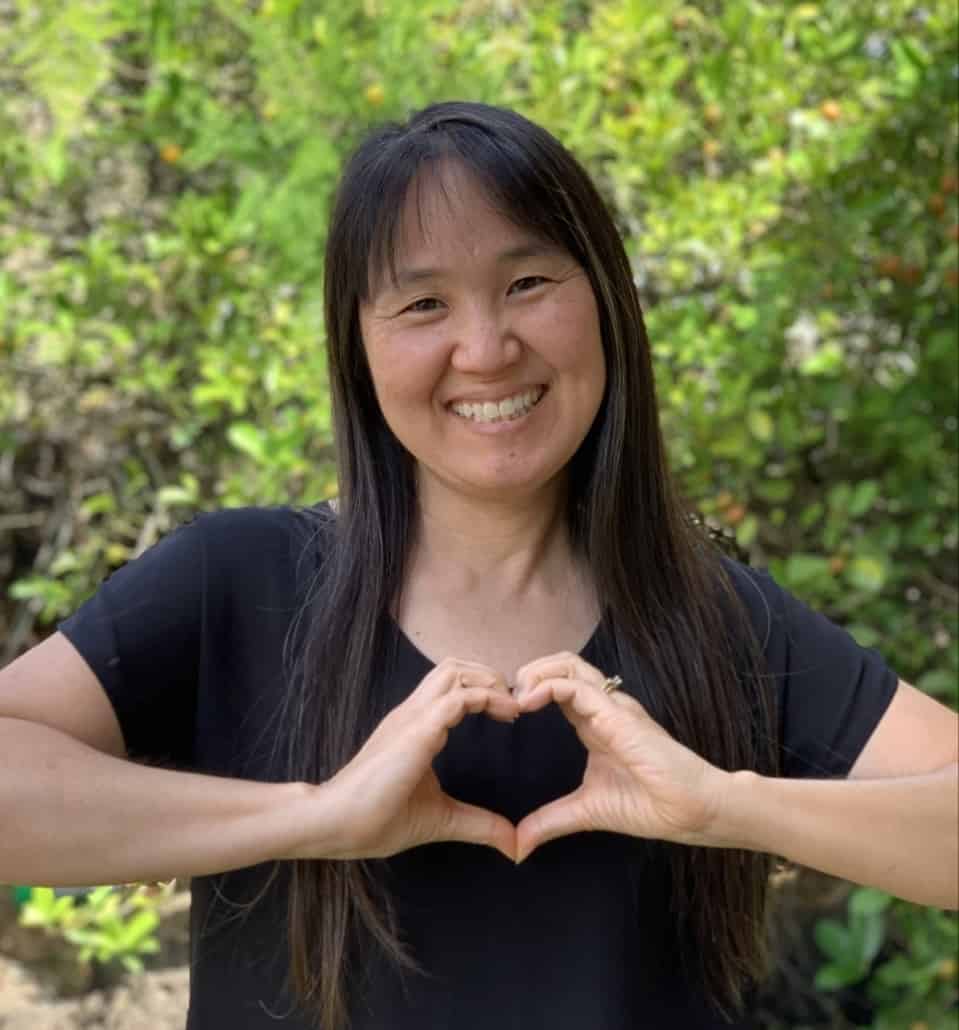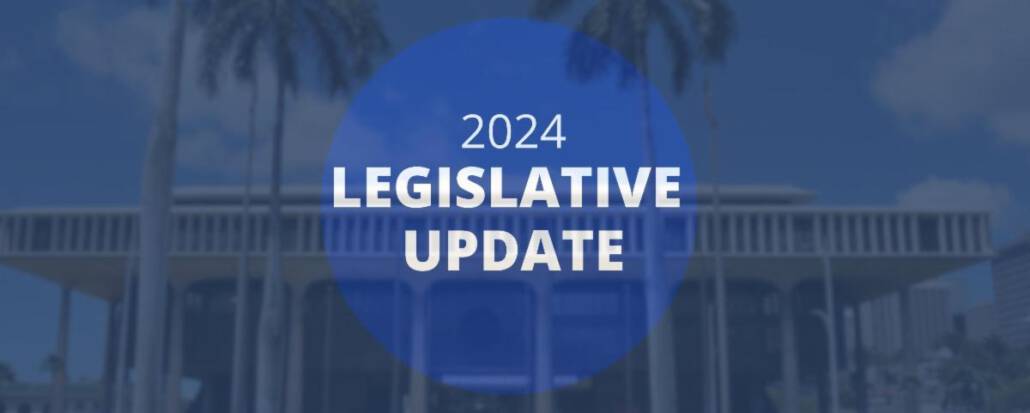OUR THREE PRIORITIES
A Visual Representation of Commit to Keiki’s Critical Areas of Focus
We are pleased to unveil Commit to Keiki newest graphic, a visual representation of our three critical priorities: child care and early learning, early childhood mental health, and family violence prevention. A farmer knows that a kalo plant can only thrive when it receives the nurturing trio of sunlight, water and fertile soil. Similarly, our keiki and families need support and access to three critical areas for optimal growth.
Child care and early learning represent the sun, providing warmth and guidance; early childhood mental health is the water, nurturing emotional well-being; and family violence prevention acts as the soil, fostering safety and stability. This graphic embodies our commitment to support that every keiki’s journey towards success is nurtured with care and compassion. Join us in cultivating a future where every keiki can flourish to their fullest potential.
MAUI RECOVERY SPOTLIGHT
Commit to Keiki’s Maui Recovery Spotlight Series highlights local organizations and nonprofits that have been working to ensure that Maui’s youngest keiki and their families receive the support and resources they need in the wake of the devastating wildfires.
Q&A with Ryan Kusumoto, President and CEO
Parents and Children Together
Since its inception in 1968, Parents And Children Together (PACT) has been dedicated to supporting Hawaiʻi’s children, individuals, and families to ensure their safety and promising futures. PACT’s mission is deeply rooted in its commitment to helping families in Hawaiʻi achieve health and stability, leveraging over five decades of experience to offer a broad spectrum of essential services. These services include early education programs, mental and behavioral health support, domestic violence and child abuse prevention, family economic development, youth and community programs, and poverty interventions. PACT’s mission goes beyond mere statements, embodying a tangible and ongoing effort to work with Hawaiʻi’s residents towards a healthier and more stable future.
Q: What is your organization’s role in helping families with young children who’ve been affected by the wildfires on Maui? What was your immediate response after the fires?
A: PACT has had a presence on Maui serving the community through a variety of critical services including domestic violence support, child welfare, addressing sex trafficking, and providing behavioral health resources. In the aftermath of the wildfires in August 2023, PACT mobilized alongside other community providers to offer essential support to families grappling with the consequences of the disaster, focusing on its core areas of expertise.
Understanding the immediate surge of basic needs support facilitated by various organizations, PACT strategically positioned itself to bolster these efforts rather than duplicate them. The organization’s immediate response was multifaceted, aiming to address both the urgent and ongoing needs of those affected.
Program Components for Immediate Response:
1.Basic Needs Support:
- Dedicated Food Pantry: To address food insecurity, a food pantry was established, providing a stable source of food supplies for the community.
- Direct Delivery of Essentials: Recognizing the critical need for immediate supplies, PACT arranged for the home delivery of groceries, bottled water, diapers, baby formula, and gas to ensure those affected had access to essential goods.
2.Wellness Checks and Other Supports:
- Comprehensive Assessments: Conducting thorough assessments to identify the specific needs and challenges that families were facing, allowing for targeted assistance.
- Counseling Services: Recognizing the psychological impact of the wildfires, access to counseling and support groups was provided to help individuals and families cope with their trauma.
- Education and Resources: Offering critical information on disaster preparedness, safety measures, and support to ensure the community is better equipped for future emergencies.
- Domestic Violence Counseling through PACT’s Family Peace Center.
- Temporary Restraining Order (TRO) filing assistance.
- Multisystemic Therapy and Family Functional Therapy Support.
Q: What are the current needs of families with young children on Maui?
A: The current needs of families with young children on Maui are multifaceted, reflecting both the unique challenges of island life and broader social issues. Here’s a breakdown of the primary needs as identified by our staff:
- Child Care (During Work Hours): Access to affordable and reliable child care during work hours is a critical need for families. With both parents often in the workforce, finding quality child care that fits within a family’s budget is a significant concern. This need extends to finding care that is flexible and can accommodate varying work schedules.
- Youth Transportation: Safe and reliable transportation for youth to and from schools, extra-curricular activities, and social services is essential. Many families may not have the means or availability to provide transportation, making community-supported solutions vital for ensuring that children can access opportunities for growth and development.
- Other Extra-Curricular Activities: Enrichment activities such as camps, sports, arts, and academic clubs play a crucial role in child development. These programs not only support learning and physical health but also provide important social interactions. However, the cost and availability are current issues.
- Social Activities to Give Parents a Break: Programs that offer safe and constructive environments for children can give parents much-needed respite. These activities allow parents to manage personal responsibilities, work, or simply rest, knowing their children are engaged in positive activities.
- Struggle to Meet Basic Needs: Many families struggle to meet basic needs such as food, clothing, and healthcare. The high cost of living on the island exacerbates these challenges, making assistance programs for nutrition, health care, and other essentials critical.
- Housing: The search for long-term, affordable housing is particularly acute among families who need larger living spaces or those who wish to remain in specific communities, such as the west side of Maui. The scarcity of affordable options forces some families into unstable living conditions or prolonged searches for suitable housing.
- Legal Support for Custody Issues: Families navigating separations, divorces, or custody disputes may require legal assistance to ensure the well-being of children. Access to affordable legal support can help protect the rights and interests of both children and parents. We have seen in increase in Domestic Violence cases as well as requests for TROs.
- Nutrition/Food Security: Ensuring that children have access to nutritious food is essential for their physical and cognitive development. Programs that address food insecurity, such as school meal programs or food banks, are vital for supporting families in need.
- Teen Programs: Engaging teenagers in positive activities and programs that support their development and transition into adulthood is crucial. Programs focused on career exploration, mentorship, life skills, and academic support can help teens navigate the challenges of adolescence.
Q: What are your needs in order to continue to provide services to families with young children on Maui in the long term?
A: To ensure the provision and continuity of services for families with young children on Maui, our primary needs encompass a comprehensive approach involving funding, program development, policy changes, and community investment. Here are the specific areas requiring attention:
- Funding: Need for funding to address the challenges outlined. This includes support for:
- Financial assistance to aid clients with basic needs and provide emotional support.
- Initiatives focused on mental health and support for the youth.
- Education programs for teachers and counselors, aiming to increase the number of qualified professionals in our schools and on the ground to offer much-needed support.
- Extracurricular activities for youth during after-school hours.
- Education and Professional Development:
- Teacher education programs are crucial for staffing our schools with qualified educators, thereby enhancing the quality of education and support available to our children.
- Counselor education programs to train more professionals capable of providing the necessary mental health support and guidance.
- Community Resources:
- The development of consistent resource fairs to facilitate on-the-spot applications for services.
- Investment in community resources like clean, safe parks with well-maintained and stocked bathrooms.
- Libraries hosting early literacy programs for infants and caregivers, offering spaces where parents can connect, build community, and find respite.







